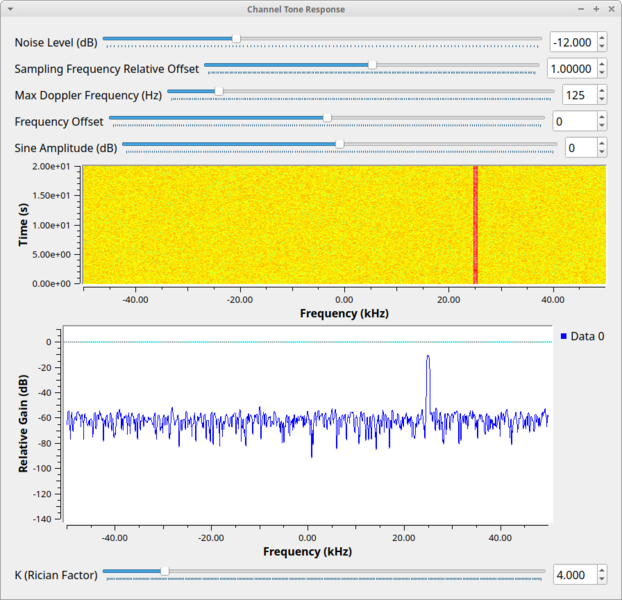Fading Model: Difference between revisions
Jump to navigation
Jump to search
No edit summary |
(add Example Flowgraph) |
||
| Line 27: | Line 27: | ||
== Example Flowgraph == | == Example Flowgraph == | ||
This flowgraph can be found at [https://raw.githubusercontent.com/gnuradio/gnuradio/master/gr-channels/examples/channel_tone_response.grc] | |||
[[File:Channel_tone_response_fg.png|800px]] | |||
== Example Output == | |||
[[File:Channel_tone_response_out.png|622px]] | |||
== Source Files == | == Source Files == | ||
Latest revision as of 12:16, 19 December 2021
This block implements a basic fading model simulator that can be used to help evaluate, design, and test various signals, waveforms, and algorithms.
This algorithm implements the method described in
Compact Rayleigh and Rician fading simulator based on random walk processes
A. Alimohammad S.F. Fard B.F. Cockburn C. Schlegel
26th November 2008
Parameters
(R): Run-time adjustable
- Num Sinusoids (SoS model)
- The number of sinusoids to use in simulating the channel; 8 is a good value
- Normalized Max Doppler (fD*Ts) (R)
- Normalized maximum Doppler frequency, fD * Ts
- LOS Model
- Include Line-of-Site path? selects between Rayleigh (NLOS) and Rician (LOS) models
- Rician factor (K) (R)
- Rician factor (ratio of the specular power to the scattered power)
- Seed
- Number to seed the noise generators
Example Flowgraph
This flowgraph can be found at [1]
Example Output
Source Files
- C++ files
- [2]
- Header files
- [3]
- Public header files
- [4]
- Block definition
- [5]

